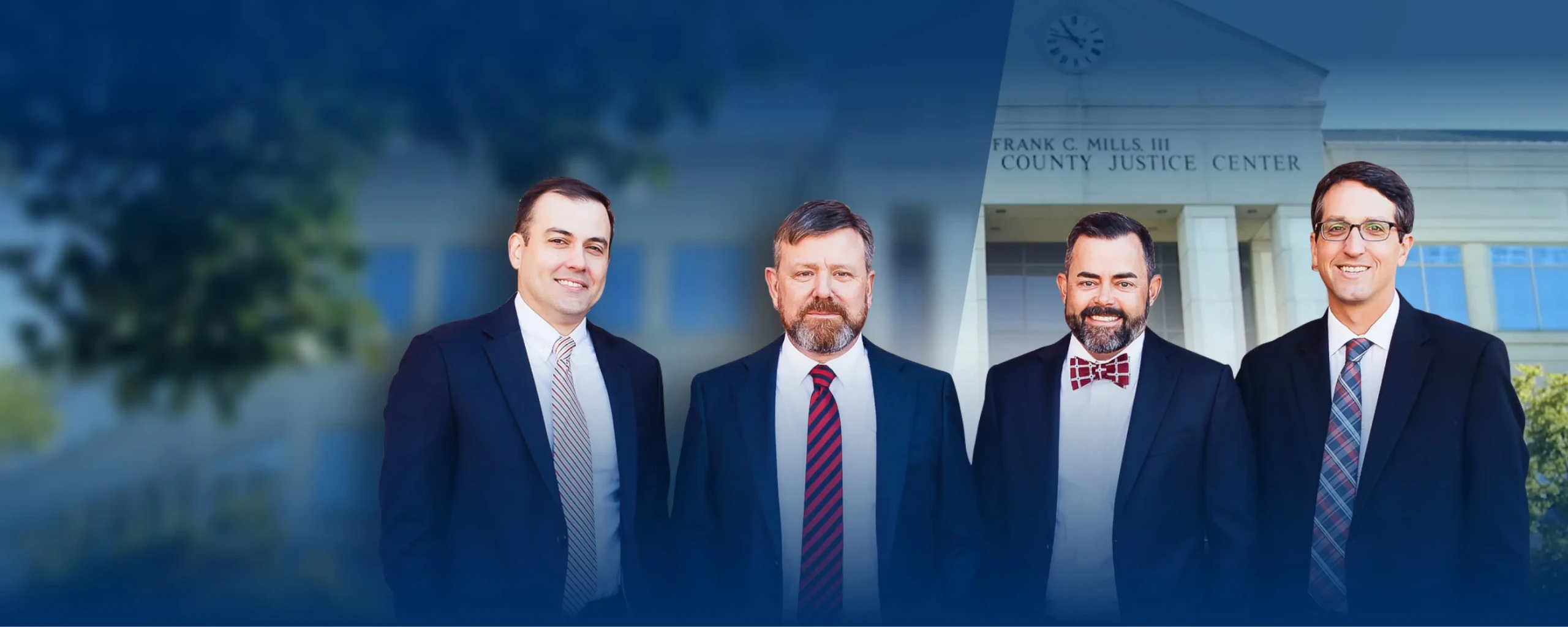
If you are being investigated or facing criminal charges, you may not know where to turn for support. In times of legal trouble, it’s important to remember that you have the right to remain silent and the right to an attorney. Exercise these rights and consult with a criminal defense attorney in Canton before making any statements to law enforcement.
Speights Law understands that this is an overwhelming period in your life. Our legal team will protect your rights and guide you through the legal process. We have over 20 years of legal experience defending our clients; let us help protect your future. Call today to schedule a confidential consultation.
We understand the gravity of facing criminal charges and the impact they can have on your life. We believe in fighting tirelessly to protect your rights and interests with strong legal advocacy to support our clients. You can trust us to make your voice heard and defend your case with determination. By handling a wide range of criminal defense cases, we are knowledgeable and experienced in different areas of the law. We can easily adapt our legal strategy to fit your unique case and personal goals.
Types of Criminal Defense Cases We Handle
At our law firm, we want to empower our clients by offering all the information you need to make informed decisions about your case. Our criminal defense lawyers will review how relevant laws impact your case and fight alongside you for the best possible outcome. Our Canton criminal defense team includes legal professionals with a variety of focuses:
- Canton Drug Crimes Lawyer
- Canton Domestic Violence Lawyer
- Canton Aggravated Assault Lawyer
- Canton DUI Defense Lawyer
Appeals
If the court made an unfavorable decision regarding your case, this does not have to be the end of the road. A criminal law appeal is a legal process that allows a party dissatisfied with a court’s decision to request a higher court to review and reconsider the case.
Under O.C.G.A. § 5-6-34, you have the right to appeal the initial verdict. Typically, the appellant claims that legal errors or procedural irregularities occurred during the initial trial, leading to an incorrect outcome.
Appeals can address a range of issues, including:
- Misinterpretation of law
- Improper admission or exclusion of evidence
- Errors in the judge’s instructions to the jury
- Violation of constitutional rights
- Prosecutorial misconduct
Unlike the trial phase, appeals focus on reviewing the application of the law rather than re-examining the facts of the case. Issues that can be raised on appeal typically fall within one of three areas:
- the trial judge made a mistake such as misinterpreting the law, improperly admitting or excluding evidence, etc;
- the state made a mistake such as failing to turn over evidence or failing to prove a required portion of the case or
- the trial attorney made a mistake which resulted in the accused failing to have effective representation at trial such as failing to call a witness or failing to present evidence.
The appellate court’s decision may affirm, reverse, or modify the lower court’s ruling, ultimately shaping the outcome of the legal proceedings.
Drug Crimes
In the state of Georgia, a drug crime conviction carries significant repercussions. According to state law, individuals can face criminal charges for various drug-related activities, including distribution, manufacturing, possession, use, sale, or importation of specific substances.
Under O.C.G.A. § 16-13-30, penalties for violation of Georgia’s controlled substance and dangerous drug laws include:
- Monetary fines
- Incarceration
Examples of such substances encompass illicit drugs like methamphetamine or heroin, as well as prescription medications such as oxycodone and hydrocodone unless the individual has legal authorization or a valid physician’s prescription. Our criminal defense lawyers have experience handling different types of drug crime cases in Georgia.
Domestic violence generally refers to a pattern of abusive behaviors carried out by one partner against another within an intimate relationship or household. These behaviors can encompass physical, emotional, psychological, financial, or sexual abuse, and they are intended to exert power and control over the victim. In Georgia, these crimes are prosecuted under the Family Violence Act.
The crimes that fall under the Family Violence Act are:
- Any felony
Or the misdemeanors of:
- Battery
- Simple battery
- Simple assault
- Assault
- Stalking
- Criminal damage to property
- Unlawful restraint
- Criminal trespass
Domestic Violence Crimes
Examples of behaviors or actions that fall under domestic violence include:
- Verbal abuse or intimidation
- Assault
- Stalking
- Threatening to do bodily harm or cause death
- Harassing by phone or emails
- Committing rape/sexual assault
- Beating and molesting
These types of charges are taken seriously in Georgia, and they often carry immediate restrictions. However, if you contact our criminal defense lawyers in Canton as soon as possible, we will have more time to work on your defense and diminish or avoid the negative legal consequences.
Serious Felonies
In Georgia, felony charges encompass a broad range of serious offenses, each carrying significant legal consequences. Felonies are criminal offenses that are more severe than misdemeanors and may result in harsh penalties, including jail time.
The legal team at Speights Law is experienced in defending cases in the most serious felony categories, including:
- Canton Aggravated Assault Lawyer
- Canton Sex Crimes Lawyer – including aggravated child molestation, aggravated sodomy or violation of the sex offender registry
- Canton Violent Crimes Lawyer including murder and aggravated battery
Our criminal defense attorneys understand the gravity and urgency of felony charges. We recognize the profound impact that a felony conviction can have on your life and the long-lasting consequences on your personal and professional reputation. With our extensive knowledge of Georgia’s legal landscape, we provide comprehensive legal advice tailored to your criminal charges.
The Benefits of Hiring Our Criminal Defense Attorneys in Canton
The lawyer you choose to work with on your defense strategy can impact the outcome of your case. At our law firm, you will be our number one priority. Our experienced criminal defense attorneys will tirelessly advocate for your rights and craft a strong defense tailored to the unique circumstances of your case.
Experienced Legal Representation
If you hire our criminal defense lawyers, you can expect experienced legal representation. We have nearly 25 years of experience in defending those in need throughout Georgia. During this period, we have handled a wide range of cases and developed effective strategies in advocating for our clients’ rights.
Open Communication
We understand that facing criminal charges can be an incredibly stressful experience, which is why we prioritize clear lines of communication with our clients. From the initial consultation to the resolution of your case, our attorneys will keep you informed every step of the way. We will update you about the progress, strategies, and potential outcomes of your defense.
Confidential Consultations
We want to establish a foundation of trust between you and our legal team. Our attorneys offer confidential consultations so you can freely discuss the details of your case without fear of your information being shared or compromised.
By providing a safe environment, we encourage open and honest communication. This allows us to gather all the necessary information to build a strong defense strategy.
A History of Successful Case Results
Our Canton criminal defense attorneys have a long history of delivering positive results for our clients. We have successfully represented many individuals facing a wide range of criminal charges, from misdemeanors to serious felonies.
Our attorneys have a deep understanding of the local legal system, including the courts, judges, and prosecutors, which allows us to develop effective strategies tailored to each unique case.
Call Our Canton Criminal Defense Lawyers Today
If you face criminal charges, you might be worried about your future. At Speights Law, our experienced lawyers offer empathetic legal guidance through this difficult period. We will listen to your concerns, answer your questions, and provide honest and realistic assessments of your case.
Our goal is to alleviate your worries and empower you to make informed decisions about your defense strategy. Contact us today to discuss your options.

